After being a Novo Nordisk (NVO) investor for some time, I decided to delve deeper into the industry trends surrounding GLP-1 medications, which have been achieving impressive milestones in the fight against obesity.
In this comprehensive post, we'll explore the revolutionary impact of GLP-1 receptor agonists on weight loss treatment, examine the key players shaping the market, and uncover the emerging trends that are set to define the future of obesity management. From oral formulations to combination therapies, we'll dissect the innovations driving this rapidly evolving sector and their potential implications for both patients and investors.
Introduction to the GLP-1 Weight Loss Market
The weight loss industry has witnessed a revolutionary shift with the emergence of GLP-1 receptor agonists. These weight loss medications have transformed the landscape of obesity treatment, sparking intense interest among healthcare professionals and investors alike. This comprehensive guide delves into the top trends shaping the GLP-1 weight loss market, offering valuable insights for potential users and investors.
Understanding GLP-1 Medications for Weight Management
What Are GLP-1 Receptor Agonists?
GLP-1 receptor agonists are a class of prescription medications that mimic the effects of glucagon-like peptide-1 (GLP-1), a naturally occurring hormone in the body. Originally developed to treat type 2 diabetes, these drugs have shown remarkable efficacy in promoting weight loss. The discovery of their weight loss potential has led to a paradigm shift in obesity treatment, offering new hope to millions struggling with excess body weight.
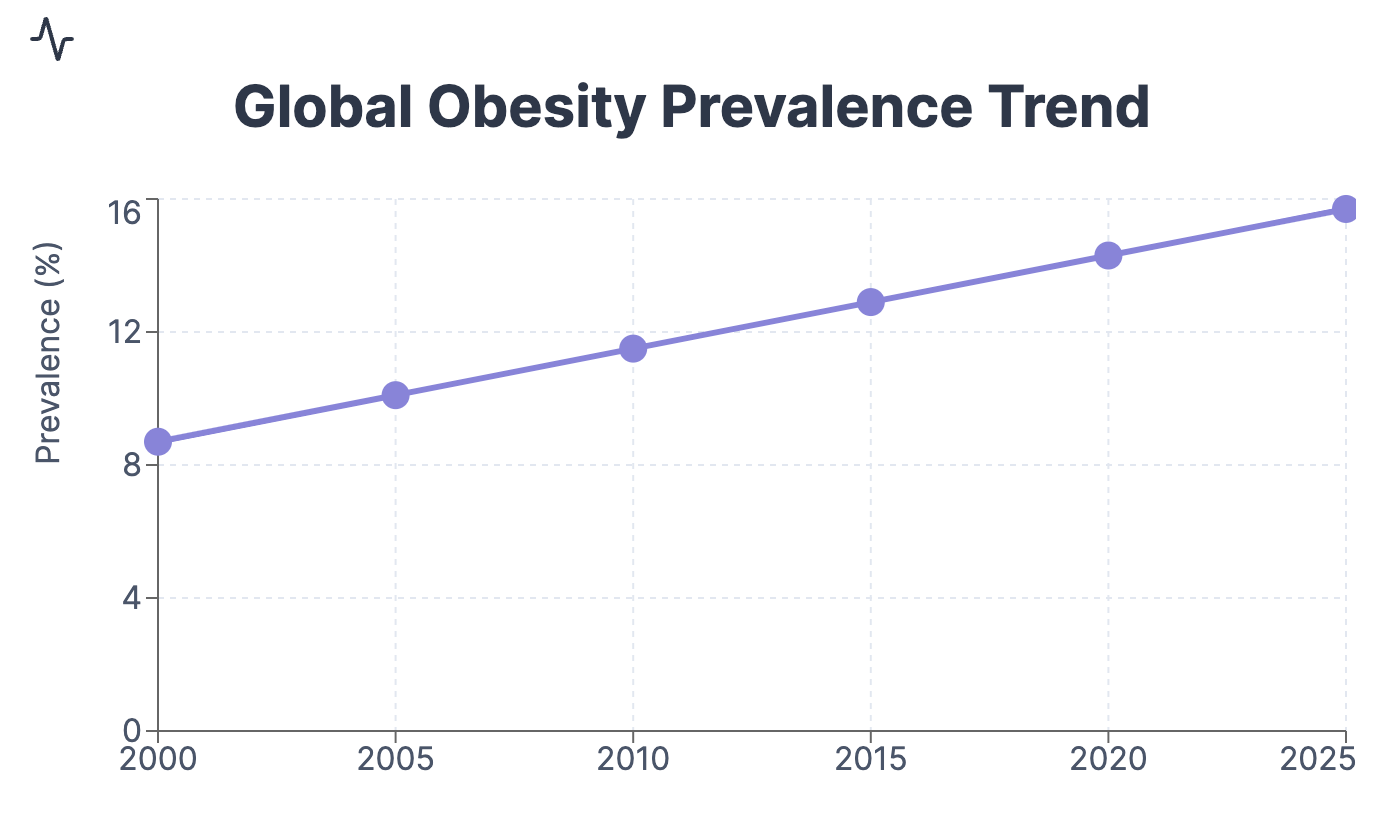
Before you dive into our in-depth analysis, we have a quick request:
If you find value in this content, please consider sharing it!
Why? Your shares help us reach more readers, allowing us to keep producing high-quality, in-depth analyses like this one—completely free, with no paywalls or subscriptions.
How Do GLP-1 Medications Work for Weight Loss?
GLP-1 weight loss medications function through several sophisticated mechanisms that collectively contribute to weight reduction:
- Appetite Control: They act on the brain’s appetite control centers, reducing hunger signals and increasing feelings of satiety.
- Slowed Gastric Emptying: These medications slow down food movement through the stomach, prolonging feelings of fullness.
- Insulin Sensitivity: By improving the body’s response to insulin, these drugs help regulate blood sugar levels more effectively.
These combined effects lead to a natural decrease in food intake and calorie consumption, supporting sustainable weight loss without the constant struggle of willpower that many dieters face. However, it is important to consult a healthcare provider before starting treatment, as these medications can have side effects, including potential complications related to digestive and kidney diseases.Nu Holdings Ltd's Sophisticated Credit Risk Management Strategy
Key Players in the GLP-1 Weight Loss Market
The GLP-1 weight loss market is dominated by several pharmaceutical giants who have invested heavily in research and development:
- Novo Nordisk: Leading the market with products like Wegovy (semaglutide) and Saxenda (liraglutide).
- Eli Lilly: Entered the market with Mounjaro (tirzepatide), showing promising results in clinical trials.
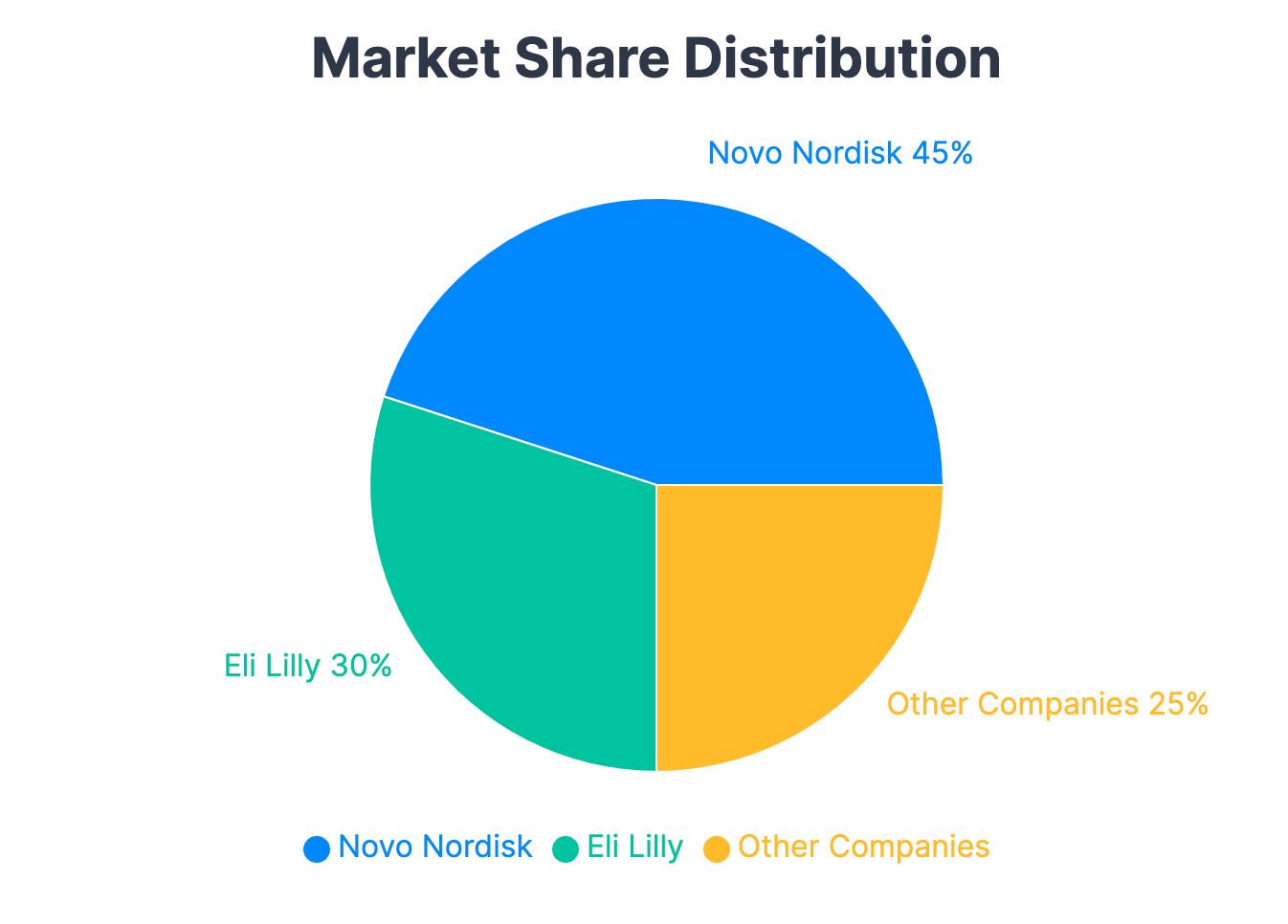
As competition intensifies, we can expect to see more innovative products and formulations entering the market in the coming years.
The Rising Demand for Weight Loss Drugs
The demand for weight loss drugs, particularly GLP-1 medications, has skyrocketed in recent years. This surge can be attributed to several factors:
- Increasing prevalence of obesity worldwide
- Growing awareness of the health risks associated with excess weight
- The impressive efficacy of GLP-1 medications demonstrated in clinical trials
- Celebrity endorsements and social media buzz
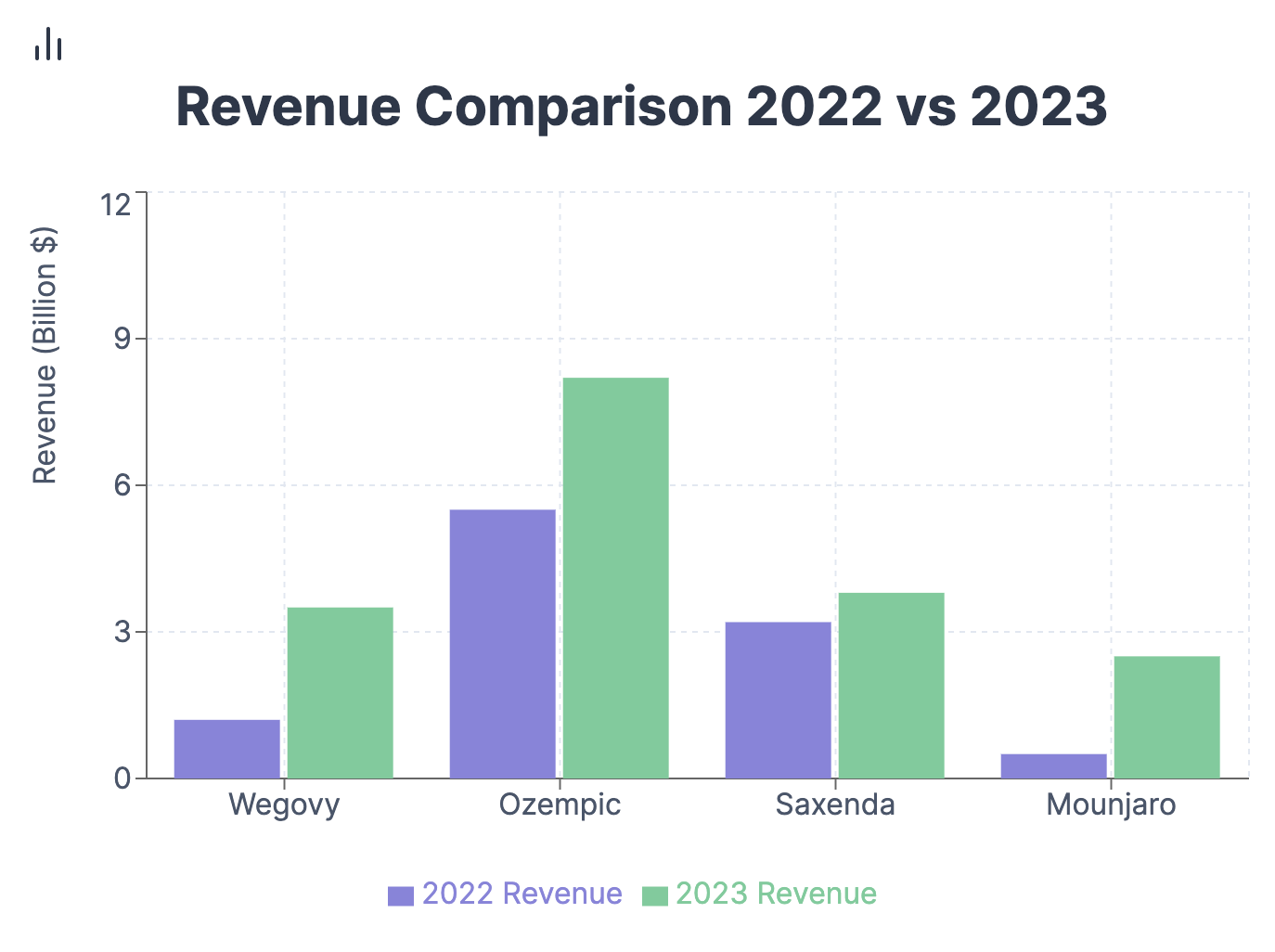
Studies have shown that these medications can help people lose weight more effectively when combined with lifestyle changes such as healthy eating and physical activity.
Why is Ozempic so popular right now?
Ozempic, a brand name for semaglutide, has gained immense popularity recently, despite being originally approved to treat type 2 diabetes. Its off-label use for weight loss has driven much of this popularity. Several factors contribute to Ozempic's current buzz:
- Significant Weight Loss Results: Many users report substantial weight loss, often more than with other weight loss medications.
- Celebrity Endorsements: High-profile celebrities have publicly discussed their use of Ozempic for weight loss, increasing its visibility.
- Social Media Trends: The drug has gone viral on platforms like TikTok, with users sharing their weight loss journeys.
- Ease of Use: As a once-weekly injection, Ozempic is more convenient than daily medications.
- Dual Benefits: For individuals with both obesity and type 2 diabetes, Ozempic offers benefits for both conditions.
However, it's crucial to note that the popularity of Ozempic has led to supply shortages, affecting patients who need the medication for its approved use in diabetes management. This highlights the need for responsible prescribing practices and improved production capabilities.
Emerging Trends in the GLP-1 Weight Loss Market
Expanding Indications and Off-Label Use
One significant trend in the GLP-1 weight loss market is the expansion of indications and off-label use of these medications. While some GLP-1 agonists are FDA-approved specifically for chronic weight management, others originally intended for diabetes management are being prescribed off-label to treat obesity.
These prescription drugs are increasingly recognized for their role in weight management, supplementing diet and exercise to achieve better results.
This trend has led to a surge in demand for medications like Ozempic (semaglutide) and Trulicity (dulaglutide). Healthcare providers, recognizing the weight loss benefits of these drugs, are increasingly prescribing them to patients struggling with obesity, even in the absence of diabetes.
Development of Oral Formulations
Traditionally, GLP-1 receptor agonists have been administered via subcutaneous injection. However, a significant trend in the market is the development of oral formulations, which could dramatically expand the accessibility and appeal of these weight loss medications.
Novo Nordisk's Rybelsus (oral semaglutide) has paved the way for this trend. While currently approved to treat type 2 diabetes, its potential for weight loss is being actively explored. The convenience of an oral pill could significantly expand the market for GLP-1 medications, making them more appealing to patients who are averse to injectable medications.
The Impact of GLP-1 Medications on the Weight Loss Market
Market Growth and Projections
The GLP-1 weight loss market has seen exponential growth in recent years, with projections indicating continued expansion. This growth is driven by several factors, including the rising prevalence of obesity worldwide, increasing awareness of health problems related to excess weight, and the demonstrated efficacy of GLP-1 medications in clinical trials.
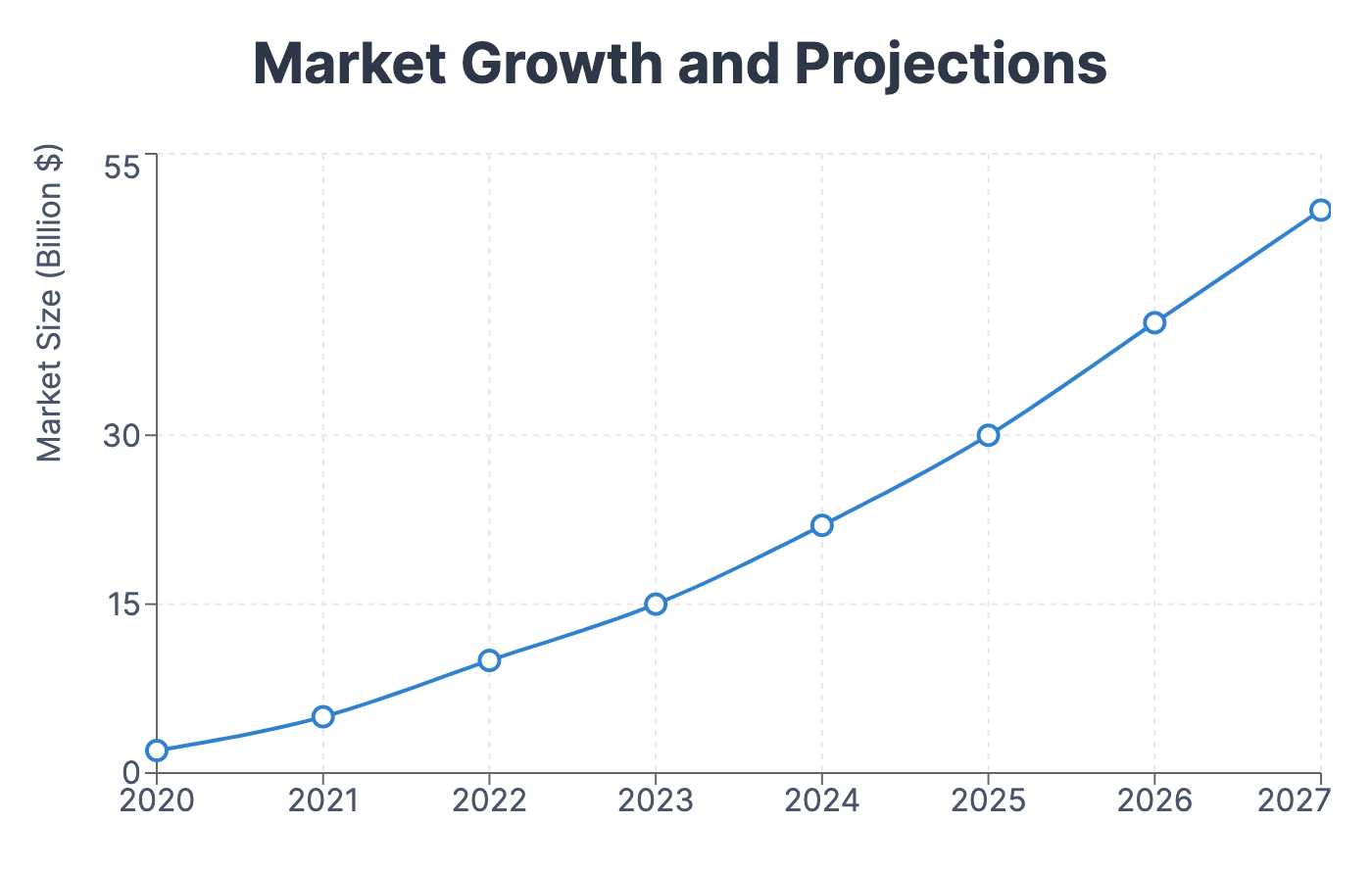
According to market research, the global GLP-1 receptor agonists market is expected to reach $25.47 billion by 2027, with a compound annual growth rate (CAGR) of 14.7% from 2020 to 2027. This remarkable growth trajectory reflects the high unmet need in obesity treatment and the potential of GLP-1 medications to address this need effectively.
How much is the weight-loss drug market worth?
The weight-loss drug market has experienced significant growth, particularly driven by the success of GLP-1 receptor agonists. As of 2021, the global weight loss drugs market was valued at approximately $2 billion. However, with the introduction of highly effective GLP-1 medications for weight loss, the market is projected to expand dramatically.
Analysts predict that the weight loss drug market could reach $50 billion or more by 2030, representing one of the fastest-growing segments in the pharmaceutical industry. This substantial growth is attributed to several factors:
- Increasing obesity rates worldwide
- Growing recognition of obesity as a chronic disease requiring medical intervention
- The proven efficacy of new weight loss medications, particularly GLP-1 agonists
- Expanding insurance coverage for weight loss treatments
- Ongoing research and development leading to new, more effective treatments
It's important to note that these projections are based on current trends and could be influenced by factors such as regulatory changes, new product approvals, and shifts in healthcare policies.
What company is making the new weight-loss drug?
Several pharmaceutical companies are at the forefront of developing and marketing new weight-loss drugs, particularly in the GLP-1 receptor agonist category:
- Novo Nordisk: This Danish pharmaceutical company is a leader in the GLP-1 weight loss market. They produce:
- Wegovy (semaglutide): FDA-approved for chronic weight management
- Saxenda (liraglutide): An earlier GLP-1 medication also approved for weight loss
- Ozempic (semaglutide): Approved for type 2 diabetes but used off-label for weight loss
- Eli Lilly: This American pharmaceutical giant has entered the market with:
- Mounjaro (tirzepatide): A dual GIP/GLP-1 receptor agonist approved for type 2 diabetes, with promising weight loss results in clinical trials
- Pfizer: Currently developing danuglipron, an oral GLP-1 receptor agonist in clinical trials for obesity and type 2 diabetes
- AstraZeneca: Developing cotadutide, a dual GLP-1/glucagon receptor agonist in clinical trials for obesity and non-alcoholic steatohepatitis (NASH)
These companies, among others, are continuously investing in research and development to create more effective and convenient weight loss medications. The competition in this space is driving innovation and potentially leading to better treatment options for individuals struggling with obesity.
The Future of GLP-1 Medications in Weight Loss Treatment
Emerging Research and Clinical Trials
The future of GLP-1 medications in weight loss treatment looks promising, with ongoing research and clinical trials exploring new applications and formulations:
- Pediatric Obesity Treatment: Researchers are exploring the potential use of these medications in treating childhood obesity.
- Combination with Bariatric Surgery: Studies suggest that using these drugs before or after weight loss surgery could enhance outcomes and improve long-term weight maintenance.
- Extended-Release Formulations: Development of formulations allowing for less frequent dosing could improve patient adherence and potentially reduce side effects.
Potential Impact on Obesity-Related Health Outcomes
As GLP-1 medications become more widely used for weight loss, researchers are studying their potential impact on obesity-related health outcomes:
- Cardiovascular Health: Some GLP-1 agonists have shown a reduction in major adverse cardiovascular events in patients with type 2 diabetes.
- Glycemic Control: These medications may offer better blood sugar control for individuals with or at risk of diabetes.
- Quality of Life: Researchers are exploring how sustained weight loss affects various aspects of well-being, from mobility and self-esteem to depression and anxiety.
Additionally, some medications like bupropion-naltrexone not only assist in weight loss but also treat depression, highlighting their multifaceted roles.
The Role of GLP-1 Medications in Treating Obesity-Related Conditions
GLP-1 medications are increasingly being studied for their potential to treat overweight and obesity-related conditions beyond just promoting weight loss. Some areas of research include:
- Non-alcoholic fatty liver disease (NAFLD) and non-alcoholic steatohepatitis (NASH): GLP-1 agonists have shown promise in reducing liver fat and improving liver function.
- Cardiovascular disease: These medications may have direct cardiovascular benefits beyond those associated with weight loss.
- Polycystic ovary syndrome (PCOS): GLP-1 agonists are being studied for their potential to improve metabolic parameters and fertility in women with PCOS.
- Neurological disorders: Some research is exploring the potential neuroprotective effects of GLP-1 agonists in conditions like Alzheimer's disease and Parkinson's disease.
Comparing GLP-1 Medications with Other Weight Loss Approaches
GLP-1 Medications vs. Traditional Weight Loss Methods
When compared to traditional weight loss methods like diet and exercise alone, GLP-1 medications offer several advantages:
- Significant Weight Loss: Clinical trials have shown that GLP-1 medications can lead to more substantial weight loss than lifestyle interventions alone.
- Appetite Control: These medications help regulate appetite, making it easier for individuals to adhere to a reduced calorie diet.
- Metabolic Benefits: Beyond weight loss, GLP-1 medications can improve various metabolic parameters, including blood sugar control and cardiovascular risk factors.
However, it's important to note that GLP-1 medications are most effective when used in conjunction with lifestyle modifications, including a healthy diet and regular physical activity.
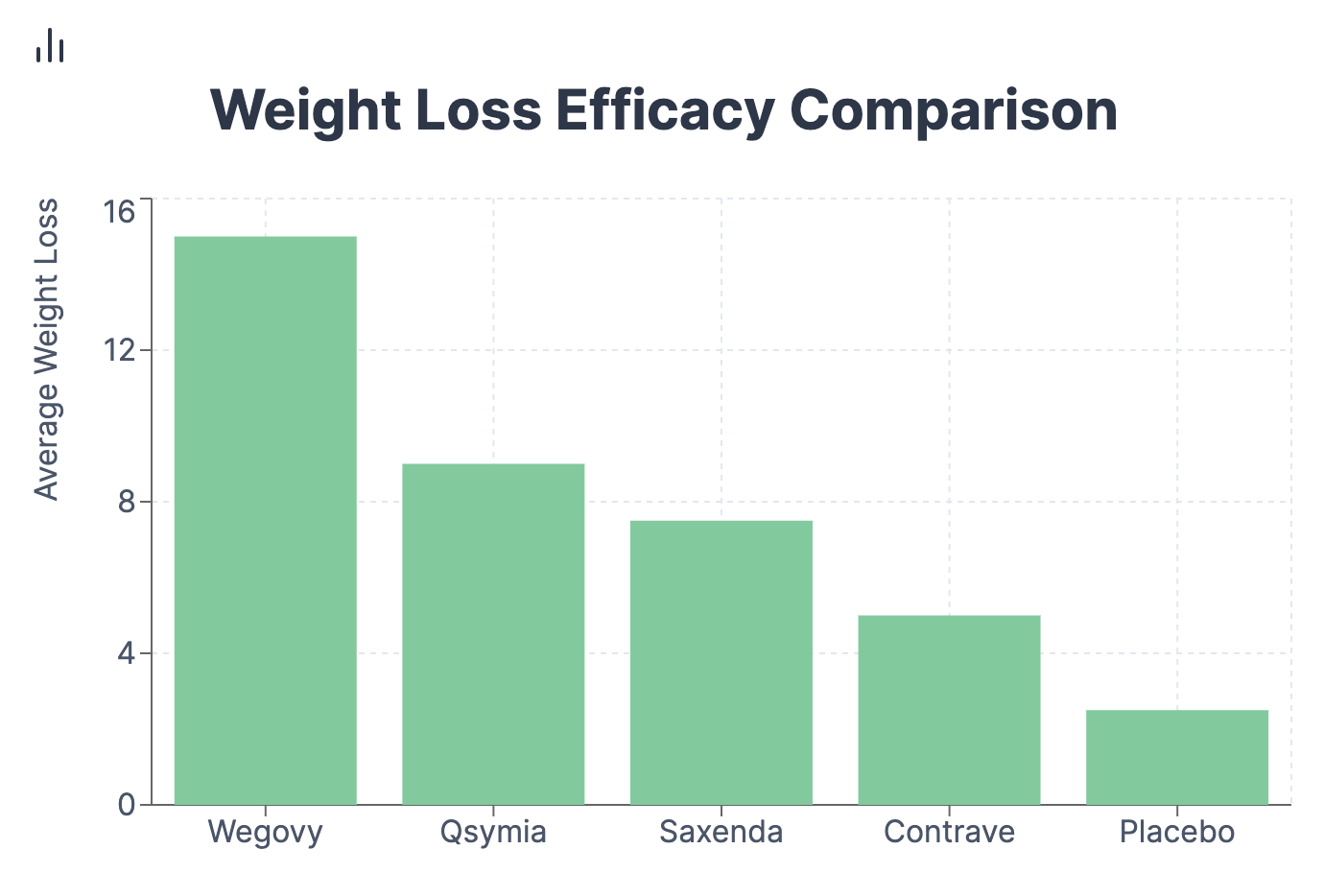
GLP-1 Medications vs. Other Weight Loss Drugs
Compared to other FDA-approved weight loss medications, GLP-1 agonists have shown superior efficacy in clinical trials:
- Greater Weight Loss: On average, GLP-1 medications lead to more significant weight loss than other prescription weight loss drugs.
- Improved Glycemic Control: For individuals with type 2 diabetes, GLP-1 medications offer the added benefit of improved blood sugar control.
- Cardiovascular Benefits: Some GLP-1 agonists have demonstrated cardiovascular benefits, which is not typically seen with other weight loss medications.
However, the choice of medication should always be made in consultation with a healthcare provider, considering individual health status, medical history, and potential side effects.

Safety Considerations and Side Effects of GLP-1 Medications
While GLP-1 medications have shown significant efficacy in weight loss, it's crucial to consider their safety profile and potential side effects:
Common Side Effects
The most common side effects of GLP-1 medications include:
- Nausea and vomiting
- Diarrhea or constipation
- Abdominal pain
- Headache
- Fatigue
These side effects are typically mild to moderate and often improve over time as the body adjusts to the medication. To minimize these effects, doctors usually start patients on a low dose and gradually increase it.
Serious Side Effects
While rare, some serious side effects have been associated with GLP-1 medications:
- Pancreatitis: There is a small increased risk of inflammation of the pancreas.
- Gallbladder problems: Some patients may develop gallstones or other gallbladder issues.
- Thyroid tumors: In animal studies, some GLP-1 medications were associated with thyroid C-cell tumors. While this hasn’t been confirmed in humans, these medications are contraindicated in people with a personal or family history of medullary thyroid carcinoma.
In some cases, certain medications may also lead to weight gain, emphasizing the importance of understanding the relationship between medication and weight management.
FDA Drug Safety Communication
The FDA has issued drug safety communications regarding GLP-1 medications, emphasizing the importance of monitoring for potential side effects and using these medications as directed. Healthcare providers are advised to carefully consider the benefits and risks when prescribing these medications, particularly for patients with a history of pancreatitis or other risk factors.
Long-Term Safety Considerations
As GLP-1 medications are relatively new for weight management, long-term safety data is still being collected. Ongoing post-marketing surveillance and long-term studies are crucial to fully understand the safety profile of these medications over extended periods of use.
Accessibility and Cost Considerations
Insurance Coverage for Weight Loss Medications
Insurance coverage for weight loss medications, including GLP-1 agonists, varies widely:
- Medicare: Generally does not cover weight loss drugs, although coverage may be available for diabetes management.
- Medicaid: Coverage varies by state, with some states offering coverage for FDA-approved weight loss medications.
- Private Insurance: Coverage is improving but remains inconsistent. Many plans require prior authorization or step therapy.
The lack of consistent coverage remains a significant barrier to access for many patients who could benefit from these medications.
What is the cheapest way to get GLP-1?
While GLP-1 medications can be expensive, there are several strategies to potentially reduce costs:
- Insurance Coverage: Check if your health insurance plan covers GLP-1 medications for weight loss or diabetes management.
- Patient Assistance Programs: Many pharmaceutical companies offer programs to help eligible patients access medications at reduced costs.
- Generic Alternatives: While not available for all GLP-1 medications, some may have generic versions that are more affordable.
- Comparison Shopping: Prices can vary between pharmacies, so it's worth comparing costs at different locations.
- Prescription Discount Cards: These can sometimes offer savings on prescription weight loss medications.
- Manufacturer Coupons: Some pharmaceutical companies offer coupons or savings cards that can reduce out-of-pocket costs.
- Telemedicine Services: Some online platforms offer consultations and prescriptions for weight management medications at competitive prices.
- Clinical Trials: Participating in clinical trials for new weight loss drugs or formulations may provide access to medications at no cost, although this option comes with its own considerations and potential risks.
It's important to note that while seeking the cheapest option, patients should always prioritize safety and proper medical supervision. Using these medications without proper guidance can lead to health risks and reduced efficacy.
The Role of Healthcare Providers in Prescribing GLP-1 Medications
Healthcare providers play a crucial role in ensuring appropriate use of GLP-1 medications to treat overweight and obesity:
- Patient Evaluation: Providers assess a patient's overall health, body mass index (BMI), and the presence of weight-related medical problems to determine if GLP-1 medications are appropriate.
- Prescription and Dosing: Careful consideration is given to starting doses and titration schedules to minimize side effects and optimize efficacy.
- Monitoring: Regular follow-ups are essential to track progress, manage side effects, and adjust treatment as needed.
- Lifestyle Counseling: Providers should emphasize the importance of combining medication with a healthy diet and increased physical activity for optimal results.
- Cost Considerations: Healthcare providers can help patients navigate insurance coverage and explore cost-saving options.
Comparing Different GLP-1 Medications
What is better for weight loss: Ozempic or Wegovy?
Both Ozempic and Wegovy contain the same active ingredient (semaglutide) but are approved for different uses:
- Wegovy: FDA-approved specifically for chronic weight management, with a maximum dose of 2.4 mg once weekly.
- Ozempic: Approved to treat type 2 diabetes, with a maximum dose of 2 mg once weekly (when used off-label for weight loss).
Key considerations:
- Efficacy: Wegovy's higher maximum dose may lead to slightly more weight loss in some individuals.
- Insurance Coverage: As Wegovy is approved for weight loss, it may be more likely to be covered by insurance for this purpose.
- Availability: Due to high demand, both medications have faced supply issues, which may affect availability.
- Cost: Pricing can vary, and insurance coverage may differ between the two medications.
- Off-label Use: While Ozempic is often prescribed off-label for weight loss, this practice may affect insurance coverage and legal considerations.
The choice between Ozempic and Wegovy often depends on factors like insurance coverage, availability, and whether the patient has diabetes. Always consult with a healthcare provider to determine the most appropriate medication for your specific needs.
Other Top Weight Loss Medications in the Market
While GLP-1 agonists have gained significant attention, there are other prescription weight loss medications available:
- Phentermine-topiramate (Qsymia): A combination medication that suppresses appetite and reduces food cravings.
- Naltrexone-bupropion (Contrave): Works on brain pathways involved in food intake and cravings.
- Orlistat (Xenical): Blocks fat absorption in the intestines.
- Liraglutide (Saxenda): Another GLP-1 receptor agonist, approved for weight loss before semaglutide.
- Setmelanotide (Imcivree): Approved for weight loss in individuals with specific rare genetic disorders affecting hunger regulation.
Each of these medications has its own efficacy profile, side effects, and specific indications. The choice of medication should be made in consultation with a healthcare provider, considering individual health status, weight loss goals, and potential side effects.
Navigating the Evolving GLP-1 Weight Loss Landscape
The GLP-1 weight loss market is rapidly evolving, presenting both exciting opportunities and challenges for patients, healthcare providers, and investors. As research progresses and new formulations enter the market, it's crucial to stay informed about the latest developments in this promising field.
For those considering GLP-1 medications for weight loss, it's essential to consult with a healthcare professional to determine the most appropriate treatment plan. These medications represent a powerful tool in the fight against obesity, but they are most effective when used as part of a comprehensive approach that includes a healthy eating plan, increased physical activity, and behavioral modifications.
For investors, the GLP-1 weight loss market offers significant growth potential, but it's important to consider factors such as regulatory changes, competition, and ongoing research when making investment decisions. The market is likely to see continued innovation and potentially disruptive new entrants, making it a dynamic and exciting space to watch.
As we continue to explore the top trends in the GLP-1 weight loss market, one thing is clear: these medications have the potential to revolutionize obesity treatment and improve the lives of millions struggling with weight-related health issues. However, realizing this potential will require ongoing research, thoughtful regulation, and a commitment to making these treatments accessible to all who need them.
The journey towards effective, sustainable weight loss solutions is ongoing, and GLP-1 medications represent a significant milestone in this journey. As we look to the future, the continued evolution of these treatments promises to bring new hope and improved health outcomes for individuals around the world.
Frequently Asked Questions About GLP-1 Weight Loss Medications
What is the best drug to lose weight?
While there isn't a single "best" weight loss drug that works for everyone, GLP-1 receptor agonists like semaglutide (Wegovy) and liraglutide (Saxenda) have shown significant efficacy in clinical trials. The "best" medication depends on individual factors, including medical history, other health conditions, and personal response to the medication. It's essential to work with a healthcare provider to determine the most appropriate weight loss medication for your specific needs.
What is the most effective weight loss pill over the counter?
Over-the-counter weight loss pills generally have limited effectiveness compared to prescription weight loss medications. Some FDA-approved over-the-counter options include Orlistat (Alli), which works by blocking fat absorption. However, its effects are modest compared to prescription medications. It's important to note that many over-the-counter weight loss supplements lack strong scientific evidence supporting their efficacy and safety. Always consult with a healthcare provider before starting any weight loss regimen.
What is the cheapest way to get GLP-1?
The cost of GLP-1 medications can be significant, but there are several ways to potentially reduce expenses:
- Insurance coverage: Check if your health insurance plan covers GLP-1 medications for weight loss or diabetes management.
- Patient assistance programs: Many pharmaceutical companies offer programs to help eligible patients access medications at reduced costs.
- Generic alternatives: While not available for all GLP-1 medications, some may have generic versions that are more affordable.
- Comparison shopping: Prices can vary between pharmacies, so it's worth comparing costs.
- Prescription discount cards: These can sometimes offer savings on prescription medications.
Always consult with your healthcare provider and insurance company to explore the most cost-effective options for your specific situation.
What is better for weight loss: Ozempic or Wegovy?
Both Ozempic and Wegovy contain the same active ingredient (semaglutide) but are approved for different uses. Wegovy is FDA-approved specifically for chronic weight management, while Ozempic is approved to treat type 2 diabetes. In terms of weight loss efficacy, they are essentially the same medication at different doses:
- Wegovy: Approved for weight loss, with a maximum dose of 2.4 mg once weekly.
- Ozempic: Approved for diabetes treatment, with a maximum dose of 2 mg once weekly (when used off-label for weight loss).
Wegovy's higher maximum dose may lead to slightly more weight loss in some individuals. However, the choice between the two often depends on factors like insurance coverage, availability, and whether the patient has diabetes. Always consult with a healthcare provider to determine the most appropriate medication for your specific needs.
How big is the weight loss medication market?
The weight loss medication market is substantial and growing rapidly. As of 2021, the global weight loss drugs market was valued at approximately $2 billion. However, with the introduction of highly effective GLP-1 receptor agonists for weight loss, the market is projected to expand significantly.
Analysts predict that the weight loss drug market could reach $50 billion or more by 2030, driven largely by the success of GLP-1 medications. This represents one of the fastest-growing segments in the pharmaceutical industry.





